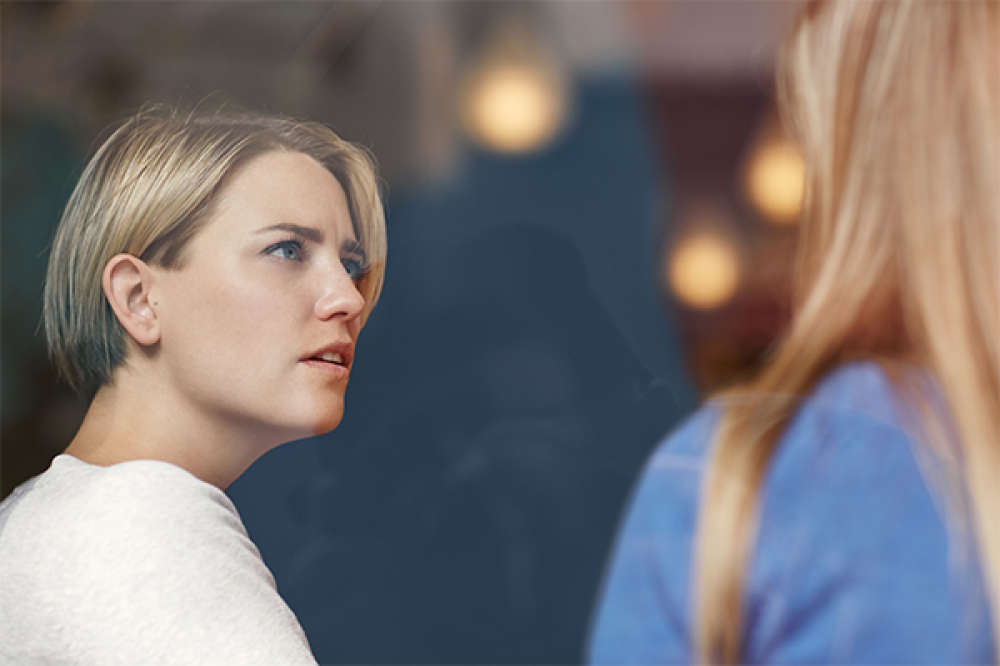Despite being invited, a friend of yours rarely goes to social events. When they do attend social events, they never stay very long and appear withdrawn. When you ask your friend why that is, your friend lets you know that they have Social Anxiety Disorder (SAD; characterized by a persistent fear of judgment, criticism, and negative evaluation in social or performance situations) and Major Depressive Disorder (MDD; characterized by a low or depressed mood for 2 or more weeks). “I’m awkward and weird and people won’t like me; I don’t like me,” they say.
How would you respond?
When faced with this situation, many of us may feel the urge to point out the many wonderful things about our friend. We may shower them with compliments, recall specific instances that they handled a social situation nicely, and take care to compliment them more in the future.
As well-intentioned as such efforts may be, research indicates that these efforts may actually be unpleasant for those with clinically significant (marked by significant distress or impairment) social anxiety and/or depression (Weeks & Howell, 2012; Weeks, Howell, & Goldin, 2013; Reichenberger et al., 2017).
How can praise hurt?
Research indicates that individuals with SAD not only experience a fear of negative attention and evaluation (ex: being made fun of), but also positive attention and evaluation (ex: receiving an award and a round of applause; Weeks et al., 2010; Weeks & Howell, 2012).
This fear of positive evaluation results in individuals perceiving positive interactions as unpleasant. Additionally, studies examining the fear of positive evaluation in SAD have shown that individuals with SAD avoid looking at videos of individuals saying both negative and positive things to the viewer, indicating that individuals with SAD also avoid both negative and positive attention and evaluation (Weeks & Howell, 2012; Weeks, Howell, & Goldin, 2013).
Recently, researchers also examined the fear of positive evaluation in individuals with MDD by presenting participants videos of an individual saying positive things to the viewer (Reichenberger et al., 2017). The participants then rated each video on its “pleasantness.” The researchers found that greater depression was associated with lower pleasantness ratings of the videos. Additionally, the researchers found that this association was explained by a fear of positive evaluation (Reichenberger et al., 2017).
Such findings indicate that, like individuals with SAD, individuals with MDD also fear and avoid positive attention. In sum, while its uncertain if and how the fear of positive evaluation affects individuals without clinically significant social anxiety or depression, the current research does indicate that for those with SAD and/or MDD, being praised and placed in the center of positive attention may be anxiety-provoking, rather than anxiety-reducing, leading them to view the situation as unpleasant.
So what can I do instead?
Listen and ask how you can help. Rather than assuming that compliments and positive attention will “turn that frown upside down,” listen to what your friend is asking for. Are they asking for a friend to just listen? Are they asking for help in seeking treatment? Are they asking for an ally in social situations? Let them tell you what they need. After all, they are the expert on their own lives.
Sources
Reichenberger, J., Wiggert, N., Agroskin, D., Wilhelm, F. H., Blechert, J. (2017). No praise, please: Depressive symptoms, reactivity to positive social interaction, and fear of positive evaluation.
Weeks, J. W. & Howell, A. N. (2012). The bivalent fear of evaluation model of social anxiety: Further integrating findings on fears of positive and negative evaluation. Cognitive Behaviour Therapy, 41(2), 83-95.
Weeks, J. W., Howell, A. N., Goldin, P. R. (2013). Gaze avoidance in social anxiety disorder. Depression and Anxiety, 30(8), 749-756.
Weeks, J. W., Jakatdar, T. A., & Heimberg, R. G. (2010). Comparing and contrasting fears of positive and negative evaluation as facets of social anxiety. Journal of Social and Clinical Psychology, 29(1) 68-94.
Carol S. Lee is a clinical psychology doctoral student at University of Massachusetts Boston. She received her Bachelor of Arts in psychology from University of California San Diego in 2012 and her master’s in clinical psychology from UMass Boston in 2015. Carol works with Dr. Sarah A.
Hayes-Skelton to examine how and why therapeutic exposures and behavioral experiments in treatments for anxiety disorders work. In an effort to examine one piece of this, Carol’s current research draws from both social and clinical psychology to examine the process behind engaging in a behavior despite any fear or anxiety associated with that behavior. Carol and Dr. Hayes-Skelton collaborate to write articles for Anxiety.org.



